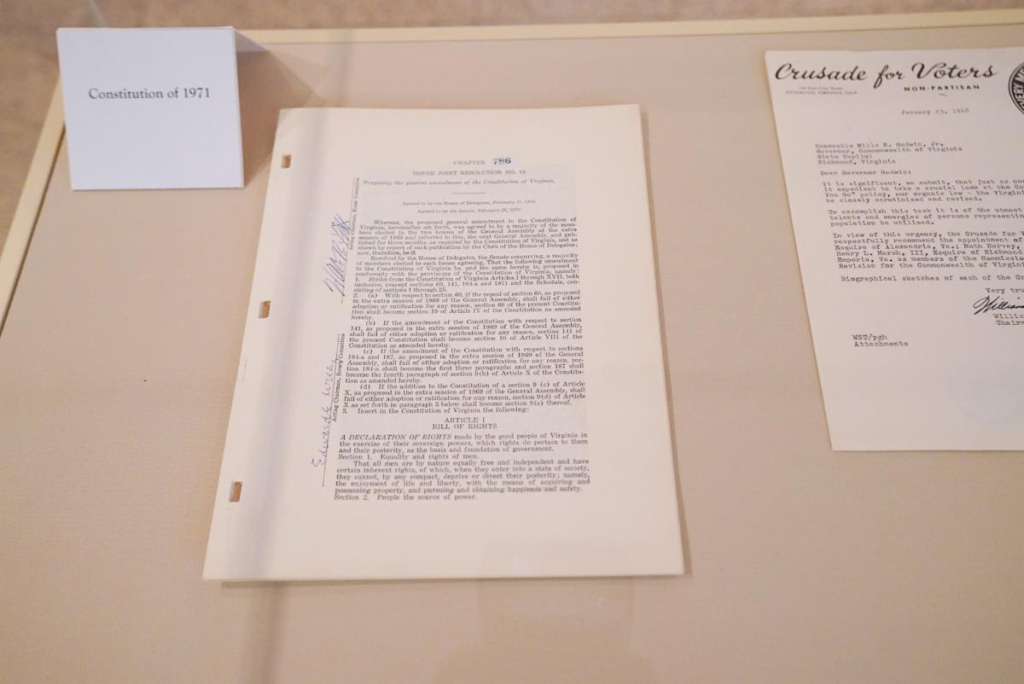Governor Northam Commemorates 50th Anniversary of the Virginia Constitution
1971 document replaced regressive constitution in place since 1902 that enshrined segregation, disenfranchisement
Governor Ralph Northam yesterday marked Constitution Day by visiting the Library of Virginia to view original copies of four of Virginia’s Constitutions and commemorate 50 years since the current Virginia Constitution took effect on July 1, 1971. Until 1971, the Virginia Constitution included detailed provisions intended to disenfranchise Black voters and prohibit racially integrated public schools. In the years after the Civil War, the brief period of Reconstruction was characterized by state and federal laws that expanded the rights and freedoms of citizens. But Virginia leaders re-wrote the state constitution explicitly to restore white supremacy, culminating in the Constitution of 1902 that instituted poll taxes, literacy tests, and other barriers to voting. The Constitution also required segregated schools by prohibiting the teaching of Black and white children in the same school. While some of the most discriminatory provisions of the 1902 Constitution were reversed by federal law or court decisions, it remained in effect in Virginia for most of the 20th century, until voters approved a new constitution in 1971.
“The 50th anniversary of Virginia’s 1971 Constitution is an important opportunity to acknowledge how our Commonwealth has evolved,” said Governor Northam. “Virginia has 400 years of history—good and bad—and it is important that we tell the accurate, honest story of our past. Understanding our full history means learning about these events and the ways they are connected to the present day, so we can work together to build a better future for all Virginians.”

The 1971 Virginia Constitution took important steps to renounce the constitution in place since 1902 by eliminating the poll tax, enshrining a ban on racially segregated schools, providing free public education for every school-aged child, and prohibiting governmental discrimination based on race, color, national origin or sex. Work on the 1971 Virginia Constitution began in 1968 when Governor Mills E. Godwin, Jr. appointed a commission to revise the 1902 document. This action came in response to the momentous social changes of the 1960s, including the passage of the Civil Rights Act and other laws that superseded discriminatory provisions in state constitutions, including that of Virginia. A.E. Dick Howard, the Warner-Booker Distinguished Professor of Law at University of Virginia School of Law, served as executive director of the Commission on Constitutional Revision 50 years ago and directed the successful referendum campaign for the ratification of a new constitution.
“Thomas Jefferson famously called for each generation to consider the extent to which a constitution serves the needs of its own time,” said Professor Howard. “In 1971, the revision commission’s purpose was to repudiate the racism of the 1902 constitution, and to put Virginia on a sound and progressive footing. I consider Virginia to have been well served by the commission—they handed us a good constitution, and the proof lies in the fact that it continues to serve the purpose of upholding a democratic government.” Virginia adopted its first Constitution on June 29, 1776, declaring the total dissolution of the rule of Great Britain and its monarch over the citizens of the Commonwealth. Virginia also led the nation by adopting the Virginia Declaration of Rights, which later influenced the United States Constitution Bill of Rights.
Virginians are encouraged to participate in events celebrating the 50th anniversary of the Virginia Constitution of 1971. A list of some of those events can be found here. The public can view original copies of Virginia’s Constitutions of 1776, 1869, 1902, and 1971 from June 29 – July 1, 2021 at the Library of Virginia in Richmond.



